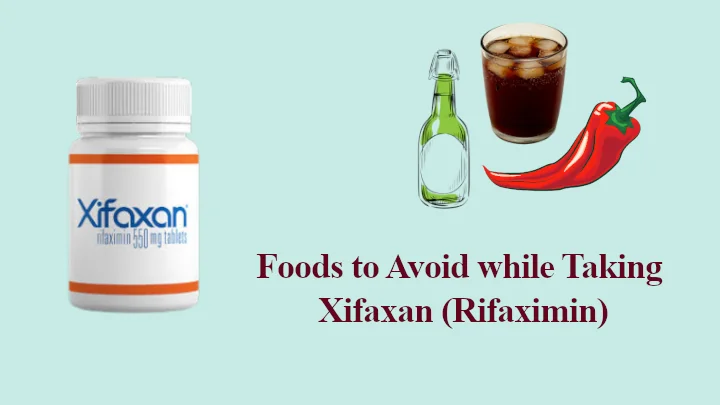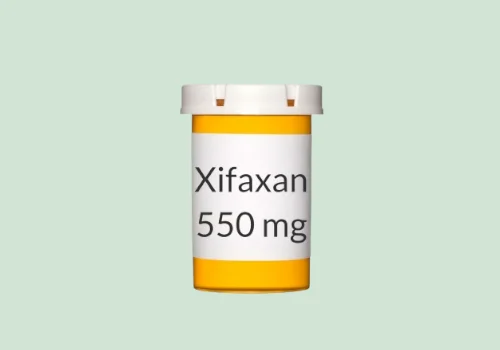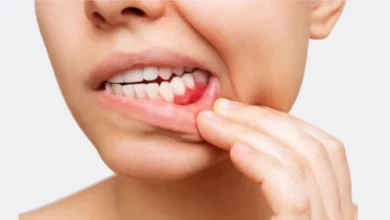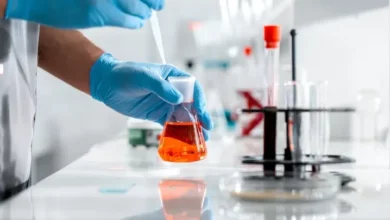11 Foods to Avoid while Taking Xifaxan (Rifaximin)

Looking for foods to avoid while taking xifaxan. Managing several health issues requires finding the ideal balance between medication and dietary choices. Antibiotic Xifaxan (rifaximin), which is frequently prescribed, is not an exception. This effective medication relieves digestive problems by treating small intestinal bacterial overgrowth (SIBO) and certain bacterial infections in the stomach.
However, it’s necessary to remember that food is essential when using this medicine, so for best results, pay attention to what you eat while using Xifaxan!
This article explores a comprehensive list of foods to avoid while taking xifaxan. To achieve a healthy balance between nutrition and medication, we seek to educate individuals with knowledge about food choices that support their treatment plan.
In This Article
Foods to Avoid while Taking Xifaxan
Here we have listed what foods to avoid while taking xifaxan for sibo:

1. Citrus Fruits
Some people with gastrointestinal issues may find that citrus fruits can exacerbate their symptoms. If this is the case for you, try limiting or avoiding citrus fruits temporarily.
It’s important to note though – there is no direct interaction between Xifaxan and citrus fruits. So if your doctor has prescribed it for your condition, please continue taking it as usual!
2. Artificial sweeteners
Artificial sweeteners, like sorbitol and mannitol, are often found in sugar-free gums and candies. They’re known as sugar alcohols because the small intestine doesn’t adequately absorb them.
Instead, when they reach the colon, they can be fermented by gut bacteria, leading to gas production that causes bloating and discomfort. That’s why it’s essential to take Xifaxan if you suffer from SIBO (small intestinal bacterial overgrowth).
This condition occurs when bacteria grow excessively in your small intestine, leading to symptoms such as gas, diarrhea, or bloating.
3. Carbonated beverage
We all love a cold soda or other carbonated beverage now and then. But did you know that these drinks contain carbon dioxide gas which can increase bloating and gas production in the digestive system?
This could be especially problematic for those with conditions like SIBO who may already experience uncomfortable symptoms such as abdominal pain, cramping, or acid reflux. So Carbonated beverages are generally advised to be avoided or consumed in moderation while taking Xifaxan.
4. Dairy products
If you’re taking Xifaxan to treat SIBO, it’s essential to know that lactose intolerance can coexist with SIBO or contribute to similar symptoms. Reduce or avoid dairy products to help alleviate any discomfort and get the most out of your Xifaxan treatment.
5. Alcohol
It is best to avoid drinking alcohol if you’re taking xifaxan. Alcohol can interfere with the effectiveness of antibiotics and may hinder the medication’s ability to kill or inhibit bacteria growth.
Consuming alcohol while taking Xifaxan can increase your chances of experiencing unpleasant side effects such as nausea and dizziness.
Both alcohol and Xifaxan can impact liver function, so combining them could lead to liver damage or impair the ability to process the medication correctly.
6. Onion and garlic
We all know onion and garlic can be delicious in the right dish, but did you know they contain fructans? Fructans are a carbohydrate that can be difficult for some people to digest.
This may cause uncomfortable symptoms like gas, bloating, or discomfort. If you’re experiencing these issues, talk with your doctor about Xifaxan, commonly prescribed to treat conditions like small intestinal bacterial overgrowth (SIBO).
7. Fatty Meats
We all love to indulge in some delicious fatty meats occasionally, but it’s essential to be aware of the potential digestive issues they can cause.
Overeating saturated fat can lead to bloating, gas, and abdominal discomfort. These symptoms could be even worse if you already have a gastrointestinal condition like SIBO.
Plus, fatty foods can delay the absorption of antibiotics like rifaximin, which might take longer for them to work properly.
8. Caffeine
Caffeine is a stimulant that can potentially aggravate gastrointestinal symptoms in some individuals, so it’s essential to be aware of this if your digestive system is already sensitive or disrupted due to taking antibiotics like Xifaxan. It might be best for you to limit or avoid caffeine consumption until your digestion has stabilized again
9. Fried foods
I want to remind you that fried foods can be delicious, but they are often high in unhealthy fats, which are more challenging for our bodies to digest.
Overeating these types of food may put additional stress on the digestive system and worsen symptoms like abdominal pain, bloating, or diarrhea if you have a gastrointestinal condition.
10. Spicy foods
If you’re taking Xifaxan for a condition like small intestinal bacterial overgrowth (SIBO), limit or avoid spicy foods, as they can irritate the digestive system and cause symptoms such as abdominal pain, diarrhea, or heartburn. This could interfere with your treatment process and reduce its effectiveness.
11. Beans and legumes
Some individuals may find beans and legumes can cause gas and bloating due to their high fiber content. Suppose you are prescribed Xifaxan for small intestinal bacterial overgrowth (SIBO).
In that case, they recommend temporarily reducing high-fiber foods during treatment as this helps reduce the symptoms of SIBO, such as bloating and gas.
Frequently Asked Questions & Answers-
Q. Does alcohol interact with xifaxan?
Ans- Alcohol can interfere with how Xifaxan is processed and metabolized in the body, potentially reducing its effectiveness. Additionally, drinking too much could stress your liver and increase your risk for side effects.
Both Xifaxan and alcohol can cause digestive issues like nausea or diarrhea; if you take them together, these symptoms may be amplified, so it’s best avoided.
Q. Can I eat yogurt while taking xifaxan?
Ans- Yes, it’s generally okay to eat yogurt while taking Xifaxan. Yogurt is an excellent source of probiotics which can help support your gut health and balance out the bacteria in your intestines when taking antibiotics like Xifaxan.
Q. Should I avoid certain foods while taking xifaxan?
Ans- It’s essential to pay attention to the foods that worsen your symptoms or cause discomfort. Everyone is different, so listening closely and being mindful of how your body reacts when you eat certain things is essential.
If something doesn’t feel right, try avoiding it for a while and see if there are any improvements in your overall health.
Q. Is it okay to take probiotics while taking xifaxan?
Ans- It’s generally safe to take probiotics while taking Xifaxan. The combination of antibiotics and probiotics is a common practice for people looking to restore balance in their gut bacteria. Probiotics can be an excellent supplement when used alongside antibiotics.
Conclusion
In conclusion, while taking Xifaxan, it is essential to be mindful of certain foods to ensure the effectiveness of the medication and minimize potential side effects. Some food restrictions are advised to use with caution.
References
- Use of rifaximin in gastrointestinal and liver diseases
- Rifaximin in irritable bowel syndrome
- Interaction between rifaximin and dietary fibre in patients with diverticular disease





